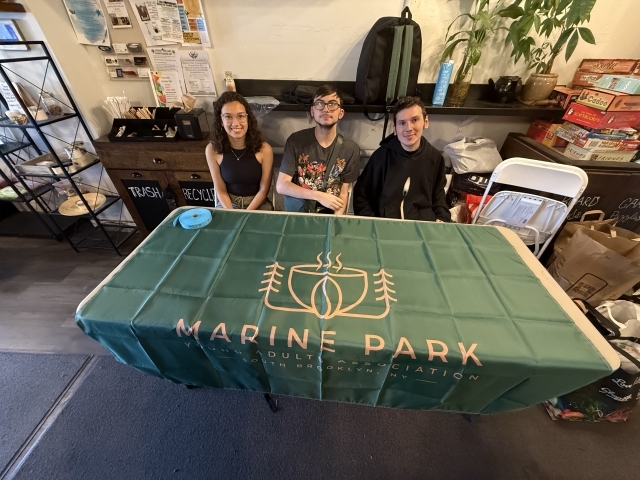How Did Your Coursework and Campus Experiences at St. John’s Prepare You for a Career in Cybersecurity?
Sam: Earning a bachelor’s degree in cybersecurity systems with a minor in digital forensics at St. John’s provided me with a solid foundation, both technically and professionally. The support of professors like Erald Troja, Ph.D., Suzanna Schmeelk, M.B.A., Ed.D., D.P.S., and Assistant Adjunct Professor Sajed Naseem was invaluable. They not only imparted knowledge but also fostered an environment where I felt encouraged to explore and grow.
The ACM (Association for Computing Machinery) Student Chapter, formerly the cybersecurity club, was another crucial element of my education. When I first arrived as a freshman, I felt overwhelmed by where to begin my journey. The lab sessions and competitions provided a unique hands-on experience that built my confidence and helped me form a community of peers who shared my interests.
What Opportunities Helped You Turn That Classroom Knowledge into Real-World Experience?
Sam: I was fortunate to secure an internship with the New Jersey Courts as an Information Security Analyst Intern early on. This opportunity came through Sajed Naseem, who is not only the Chief Information Security Officer but also plays a vital role as an Associate Adjunct Professor in The Lesley H. and William L. Collins College of Professional Studies at St. John’s University.
I believe that year-long internship was essential for my early career success. It allowed me to delve into how cybersecurity operates within an organization and to understand the daily challenges that come with it. Additionally, I earned my CompTIA Security+ certification during this time, which I recommend to anyone serious about entering the field. Just five months after graduation, I landed my current role at Gen II Fund Services. Though the job search was challenging, the combination of my internship experience, certification, and support from St. John’s faculty made me feel prepared.
As You Began Your Career, What Skills Did You Find Most Important for Success?
Sam: While employers certainly look for technical proficiency—such as a relevant degree, certifications, and internship experience—soft skills like communication, teamwork, and adaptability are equally vital. You need to explain complex issues clearly, collaborate effectively with different departments, and think critically on your feet. Moreover, resilience and curiosity are essential traits; the field is always evolving, and there’s always more to learn.
What’s One of the Biggest Career Misconceptions People Have?
Sam: A prevalent misconception is that cybersecurity roles are entry-level positions. In reality, most employers expect candidates to have some prior experience. While it’s not impossible to break into the field, you need to build a solid foundation first. I often advise students to start with information technology roles, such as help desk or systems support, acquire necessary certifications, and then transition into cybersecurity. These experiences equip you with context and troubleshooting skills, making you more effective in cyber roles.
Cybersecurity Is Constantly Evolving. How Do You Continue Learning and Pushing Your Skills Forward?
Sam: I am actively engaged with the U.S. Cyber Games, a national initiative focused on identifying and training top cybersecurity talent to represent the U.S. in international competitions like the International Cybersecurity Challenge (ICC). This program provides a platform for both students and professionals to enhance their technical skills, teamwork, and overall cyber defense readiness through hands-on training and competitions.
Last year, I had the opportunity to compete for a spot on the U.S. Cyber Team, making it to the semifinals after a series of challenging technical assessments. It was a rewarding experience that pushed me to apply advanced skills in network defense, threat analysis, and incident response, all while collaborating with talented individuals from various backgrounds.
This year, I’ve returned as a Technical Mentor. My role involves assisting with curriculum development and coaching; recently, I contributed to a lecture on attack and defense fundamentals. I also support the identification of open-source projects with exploitable vulnerabilities for our team’s CVE (Common Vulnerabilities and Exposures) exercises. It’s fulfilling to shape the next generation of cybersecurity professionals while continuously refining my own skills.
Outside of Work, How Do You Unwind from the Demands of Cybersecurity?
Sam: Giving back to the community is a passion of mine. I am involved with the Liberty Kiwanis Club based in Bay Ridge, Brooklyn, and I also founded a nonprofit called the Marine Park Young Adults Association, Inc. We organize social events like movie nights, trivia, karaoke, and game nights for young adults aged 18–35, providing an affordable way for them to connect and build community.
Finally, What Advice Would You Share with Students Who Are Just Starting to Explore a Career in Cybersecurity?
Sam: Don’t be intimidated by the vastness of the field; instead, use it to your advantage! Cybersecurity offers diverse paths, so explore each area early to discover what excites you the most. Also, embrace Artificial Intelligence (AI) tools rather than fearing them. In my current role, I use AI-driven tools like Claude to streamline analysis. The key is to learn how to use these technologies responsibly and strategically—they can enhance your effectiveness rather than replace you.


